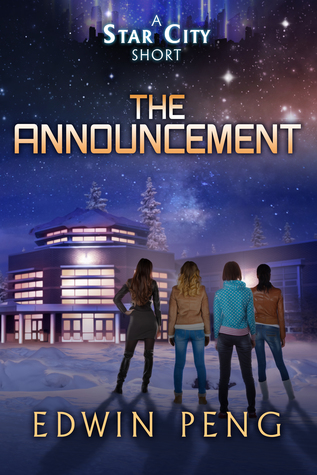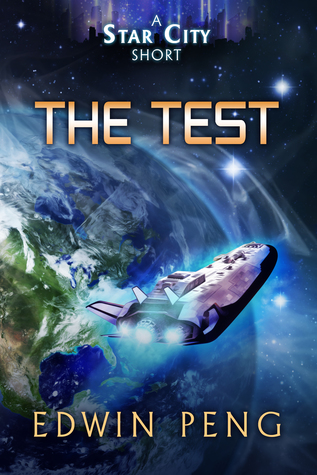Hey everyone! Sorry my post this month is a few days late! I'm interviewing author Edwin Peng, who recently released his debut novel,
Star City. It's a YA sci-fi novel (first of a planned trilogy) about alien first contact... what might happen if a race of enlightened, peace-loving extraterrestrials showed up tomorrow asking to share knowledge? You'd think that would be a good thing, but never underestimate humanity's foolishness...
The book's two main characters are Emma Smith, a college freshman chosen to be a student liaison to the aliens, and her counterpart on the alien side, Sepporinen. I read
Star City a few weeks back, and I loved it! It's a fun YA sci-fi read, but it also has some interesting social commentary. And the world-building for the alien culture is magnificent.
Star City is preceded by three prequel short stories, "The Announcement," "The Test," and "The Meeting," which provide some cool background on the characters (though you don't need to read them to read
Star City -- they're like bonus scenes).
I was thrilled to be able to ask Edwin a few questions about his book and his writing life.
 |
| Edwin Peng |
Hi
Edwin! Welcome to Across the Board! Can you tell us a bit about your background
as an author? What got you into writing?
Thank you for having me!
I’m originally from Monterey Park, CA –
a suburb of Los Angeles. I credit my parents with instilling in me the love for
reading and writing. The
Monterey Park
Bruggemeyer Library became my second home when I was a
kid. I’m sure I’m not the only child who dreamed of writing a book that would
be on the library and bookstore shelves.
I continued to write stories and
novels, but it was hard to find the time to be a productive author as I was
paying the bills and working day jobs. It wasn’t until four years ago that I
got serious as an author. I began my PhD studies at the University of
Lincoln-Nebraska, which gave me quite a lot of inspiration to write science
fiction (I’m doing high power laser research).
Star
City was my second novel that I completed
and the first that I felt confident enough to pitch to agents and publishers.
After a year, I finally found a publisher,
Evolved Publishing,
who was willing to give me the chance to share my stories with the world.
 |
| Cover of Star City |
You recently released
your debut, Star City, a YA sci-fi
novel about alien first contact. What
was the first idea you had for your book, and how did the story grow from
there?
I was inspired to write Star City because I want to tell an
exciting and funny, but at the same time realistic and socially conscious,
first contact young adult story.
As an avid young adult reader, I felt
that there weren’t many novels about aliens and/or first contact scenarios.
There’s certainly a lot of science fiction YA, but since The Hunger Games craze a decade ago, this subgenre is overwhelming
dystopian. There are many paranormal romance novels, but alien love interests
are few compared with vampires and werewolves.
Like many science fiction fans, I love
a great
first
contact story. I fear I may sound like a
pretentious MFA,
but I really think that a “first contact scenario” is the most fascinating and thought-provoking
of the common science fiction plots. Unlike
time
travel or
space
opera stories, the discovery of alien life
(whether that be a
microbe in a Mars
asteroid or a
SETI
signal) is something that can actually happen
within our lifetimes. First contact stories not only prepare us for
encountering real extraterrestrial life, but are also great for discussion of
many historical and current issues.
 |
One of Star City's three
prequel short stories |
Star City
features some amazing alien world-building. How did you go about creating the
Ba’ren culture?
Thank you for your compliments!
When I world-build for
Star City, I consciously sought to avoid
the
“Planet
of Hats” trope. Making the Ba’ren a full-fledged,
realistic alien species ironically meant making them more “human”. A
technologically advanced, spacefaring species will have many different
cultures, multiple worlds that they inhabit, and a long, complex history.
I also think it’s important for science
fiction/fantasy authors to not only create a rich world, but to consider how
that world influences their characters and plots. For instance, each alien
character in Star City has at least
one culture that he/she/they identify with and which influences what they do in
the story.
Among
your characters, who's your favorite? Could you please describe him/her?
I hate to play favorites among the many
characters in the Star City series.
If I’ve to choose, my favorite human character is Liam Smith and favorite
Ba’ren character is Arnbejoerg.
Liam is the coolest big brother who
parlayed his nerdy love for science fiction into an awesome job working with
real-life aliens. He may crack a joke during inappropriate time, but his heart
is in the right place.
Arnbejoerg is the rebellious pilot/smuggler
who proves that not all Ba’ren Juveniles are well-behaved, rule-abiding
teenagers. She is a great
foil
to Sepporinen.
 |
The second of Star City's
three prequel short stories |
What's
your favorite scene from your novel? Could you please describe it?
Obviously, I can’t describe scenes
which would spoil Star City too much.
From non-spoilery scenes, I’ll have to say the part where Sepporinen visits the
university’s dining hall with Emma as my favorite scene. I’m sure all of us who
grew up in American schools have experienced eating at a school cafeteria at
some point, so it’s fascinating to see such a scene with literal alien eyes
(or, since they are Ba’ren, smell such a scene with literal alien noses).
What's
your favorite part of writing? Plotting? Describing scenes? Dialogue?
World-building is my favorite part of
writing. I enjoy imagining a different world than ours – and the challenge of
making that world full-fledged and internally consistent.
For example, the Ba’ren sent eight
spaceships to Earth. Like many science fiction authors, I’d fun imagining these
spacecrafts: what they look like, how are they powered, and where can they
travel to. But I also enjoyed brainstorming about social science aspects: Who
will the Ba’ren send to make contact with humans? How is the Ba’ren on their
starships governed? What do the Ba’ren do to relax after a hard day’s work?
How
long does it take you to write a book? Do you have a writing process, or do you
wing it?
Too long!
Star
City took me two years to write – one year
of writing an OK draft and one year of editing.
I’m always improving my writing
process. My goal is to write the sequels to Star
City at a pace of one novel a year.
I basically have 2 rules that I follow
when writing: 1. Plan the scene before writing it and 2. Keep writing – even a
few words a day is better than none.
 |
The third of Star City's
three prequel short stories |
What drew you to
sci-fi?
Science fiction to me is the premier
genre of our time. We live in a world that, for the last few hundred years,
have changed dramatically and quickly due to scientific and technological
changes. Good science fiction can prepare us for future changes as well as
provide important commentary on our current social conditions.
Are
there any books or writers that have had particular influence on you?
Instead of actual young adult/science
fiction books, the two pieces of media that influenced
Star City the most are a pair of CW television shows:
Roswell and
Star-Crossed. Considering that the
CW
is basically the YA channel, it’s not surprising
that they experimented with two first contact/paranormal alien romance shows.
The good – and the bad – of these two series are important parts of the
research I did for
Star City.
Did you ever surprise
yourself when you were writing your book? Characters who took on lives of their
own? Plot elements that took unexpected turns?
I think what surprised me the most when
writing Star City is how my
characters can sometimes write the plot by themselves.
Thanks for stopping
by!
ABOUT THE BOOK

An alien race, the Ba’ren, makes contact with Earth. To jumpstart diplomacy with humans, the Ba’ren offer their advanced medical technology, prompting the United States government to create a joint research project, and to call for the best of the best.
Eighteen-year-old Emma Smith, ready to capitalize on this historic opportunity, beats thousands of applicants for the position of student ambassador. She knows helping the Ba’ren cure osteosarcoma will kick-start her biomedical engineering career, not to mention give her a front-row seat to learn more about the mysterious aliens.
Sepporinen, a young Ba’ren asteroid miner, cares little about meeting humans. He seeks only riches and glory in prospecting the solar system’s asteroids, but the Ba’ren government inexplicably sends him to Earth to assist with the research project, and to work with a young Earth girl.
Emma and Sepporinen draw closer as they work together, and discover far more is at stake than what their respective governments have let on. As political struggles intensify between feuding human and Ba’ren factions, anti-alien sentiment on Earth reaches a lethal pitch. The unlikely pair, determined not to be pawns in this complicated game of life and death, must risk everything to help maintain the fragile peace between their two species.
ABOUT THE AUTHOR
Edwin Peng lives in beautiful Lincoln, Nebraska with his beloved Pokémon buddy, Eevee. During the day, he indulges in super-villainy by performing high-power laser research at the University of Nebraska-Lincoln. At night, his secret identity is that of a literary superhero fighting to make the Young Adult Science Fiction genre less clichéd and more inclusive.
Edwin is the author of the Star City series, which features badass heroines and space aliens who love blueberry pies. The first novel is released by Evolved Publishing on December 4, 2017.
FIND EDWIN ONLINE
Where readers can learn more and get Star City:
Here are my social media links:







 An alien race, the Ba’ren, makes contact with Earth. To jumpstart diplomacy with humans, the Ba’ren offer their advanced medical technology, prompting the United States government to create a joint research project, and to call for the best of the best.
An alien race, the Ba’ren, makes contact with Earth. To jumpstart diplomacy with humans, the Ba’ren offer their advanced medical technology, prompting the United States government to create a joint research project, and to call for the best of the best.